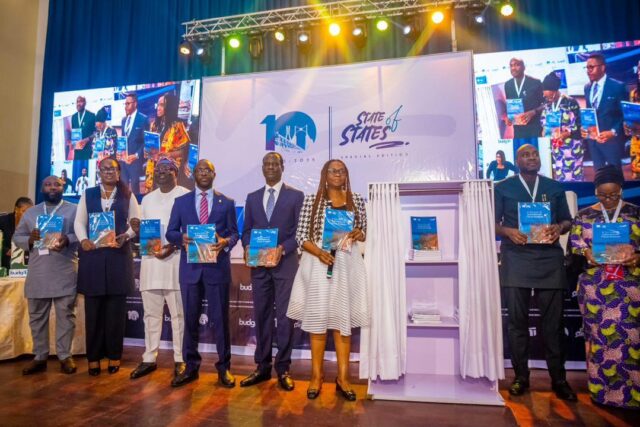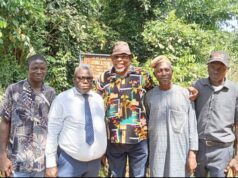By editor
The Central Bank of Nigeria (CBN) has announced a significant increase in subnational revenues, which rose to N11.38 trillion in 2024, following key fiscal and monetary reforms implemented by the federal government.
Deputy Governor (Economic Policy) of the CBN, Muhammad Sani Abdullahi, stated this on Tuesday in Abuja at the launch of the BudgIT 2025 State of States Report, with the theme: “A Decade of Subnational Fiscal Analysis: Growth, Decline, and Middling Performance”, under the ‘State of States’ report by BudgIT, marking a decade of subnational fiscal analysis and transparency tracking in Nigeria.
Abdullahi said the year 2024 was marked by unprecedented fiscal flows to state governments, largely due to reforms such as the removal of fuel subsidy and foreign exchange unification, which boosted revenue allocations across the federation.
“For the first time in many years, capital expenditure at the state level has overtaken recurrent spending, But what will define real transformation is not the size of revenue inflows, but fiscal discipline and the ability to turn windfalls into lasting development outcomes,” Abdullahi stated.

He noted that while some states recorded up to a threefold increase in revenues, the challenge now lies in ensuring that these gains translate into sustainable investments in education, healthcare, and infrastructure.
The CBN top official cautioned that without fiscal prudence, inflationary pressures could erode the real value of the revenue gains. He stressed the need for states to lock in fiscal discipline, maintain a healthy capital-to-recurrent expenditure ratio, and digitise financial management systems to improve accountability.
He also urged subnational governments to raise budget execution rates in critical sectors to above 80 percent and to hedge against foreign exchange risks to safeguard their finances.
Speaking on broader macroeconomic stability, he disclosed that Nigeria’s external reserves have risen to $43.36 billion, while FX inflows improved by 109 percent and capital importation increased by 60 percent over the past year.
He said that the reforms have helped narrow the gap between official and parallel market rates to less than 2 percent, restoring investor confidence.
“Stability is critical because it preserves the real value of state revenues. Nominal revenues may rise, but if inflation doubles, the fiscal space for development vanishes. Our goal at the CBN is to ensure that stability underpins real growth,” he noted.
Abdullahi urged state governments to continue to prioritise capital investments, compete on development outcomes rather than budget sizes, and sustain transparency and accountability reforms.
Earlier, Oluseun Onigbinde, the Global Director of BudgIT, said the State of States initiative was never intended to be “transparency for transparency’s sake” but a sustained effort to assess the fiscal health, economic capacity, and service delivery potential of Nigeria’s 36 states.
“When we began this work in 2016, it was almost impossible to find credible data at the state level. We wanted to understand not just how transparent states were, but whether they had the fiscal strength to deliver goods and services for their citizens,” Onigbinde said.
He said BudgIT’s data-driven approach has helped make transparency a competitive advantage, as governors, commissioners, and financial institutions now pay close attention to their state rankings and fiscal performance.
“From a time when only five states published budgets to now when most states publish both budgets and performance reports, the culture of openness has deepened, transparency has moved from obligation to competition,” he said.
He highlighted that while states have recorded remarkable fiscal growth with many doubling or tripling revenues in one year, the real test is how well those funds translate into improved education, healthcare, infrastructure, and livelihoods.
He said, “States are now awash with cash, But the question we must keep asking is whether these windfalls are producing better outcomes for the people.”
On his part, Razaq Fatai, representing the chairman of the Nigeria Governors’ Forum (NGF), commended BudgIT for sustaining the State of States report as an independent and credible assessment tool that supports fiscal transparency at the subnational level.
He said the forum remains committed to deepening accountability through ongoing reform initiatives such as the State Fiscal Transparency, Accountability, and Sustainability (SFTAS) programme and the State Action on Business Enabling Reforms (SABER) project, both of which have strengthened fiscal reporting and improved the investment climate across states.
“This dialogue sits at the intersection of policy learning and citizen trust, It reminds us that data, incentives, and collaboration between government and civil society can build stronger, more accountable states,” he said.
…Anambra tops 2025 State of States fiscal performance rankings
Also in the report, Anambra State topped the 2025 states’ fiscal performance ranking, overtakes Lagos
Anambra State rose from second to first position, securing the title of the best-performing state in the federation, while Lagos maintained its second place for the second consecutive year.
Kwara climbed from fourth to third, Edo entered the top five after consistently ranking within the top 10 over the last four editions, and Abia, which had never previously featured in the top 10, now ranks fourth.
Other notable movements include Akwa Ibom, which surged 17 places from 27th to 10th, and Zamfara, which moved up nine places from 26th to 17th. At the lower end of the rankings, Imo, Kogi, Jigawa, Benue, and Yobe occupy the bottom positions, with Cross River experiencing the steepest decline, falling from fifth in 2024 to 30th in 2025.
In terms of Internally Generated Revenue (IGR) performance, BudgIT report shows that Lagos State remains a returning champion with 120.87 percent, while Enugu State now leads with an impressive 146.68 percent IGR-to-operating expense ratio.
Furthermore, unlike the previous year, when six states generated enough IGR to cover at least 50 percent of their operating expenses, only five states achieved this in 2025: Abia, Anambra, Kwara, Ogun, and Edo. Consequently, 28 states still relied heavily on federal transfers and other sources to meet their recurrent expenditures.
…Nigerian states achieve 66.9% education implementation in 2025
According to the report, Nigerian states recorded an average of 66.9 percent of their education budget implementation in 2025.
The report highlights gradual improvements in fiscal discipline and governance across several states despite prevailing economic challenges.
“For education, states budgeted N2.41 trillion but spent only N1.61 trillion, achieving 66.9 percent implementation.
“Out of the 36 states, nine states, Edo, Delta, Katsina, Rivers, Yobe, Ekiti, Bayelsa, Bauchi, and Osun, exceeded 80 percent of their budgeted allocations, with Edo, Delta, and Katsina surpassing 100 percent,” the report said.
The report indicates that average per capita spending remained low at N6,981, with no state exceeding N20,000 per capita and only eight states above N10,000.
Meanwhile, in health, states budgeted N1.32 trillion but expended N816.64 billion, achieving 61.9 percent implementation.
Seven states, Yobe, Gombe, Ekiti, Lagos, Edo, Delta, and Bauchi—spent over 80 percent of their health budgets, with Yobe leading at 98.2 percent, though total expenditures remained modest.
Average per capita spending was N3,483, with only a few states exceeding N5,000, highlighting significant gaps in service delivery relative to education.
Some states, however, exceeded international/UNESCO-recommended benchmarks about 20 to 26 percent for education spending in their state budgets.
Enugu State, for instance, spent 33 percent of its budget in 2024, and Jigawa State spent 26.4 percent of its 2025 proposed budget went to education.
On the other hand, many states still fall significantly short of these benchmarks; some states allocate less than six to seven percent to education.
…VAT reform ‘ll increase states’ share to 55% -Oyedele
Also speaking at the event, Mr Taiwo Oyedele, chairman of the presidential committee on fiscal policy, said the upcoming value-added tax (VAT) reform will increase states’ share of VAT from 50 percent to 55 percent, amounting to over N4 trillion by 2026.
He said there is a need for deeper revenue reform and a rethink of Nigeria’s fiscal federalism, as simply giving more resources to subnationals without reform will not resolve the current and projected challenges.
He warned that the state governments should now review their fiscal priorities, by shifting from mere spending to strategic investments, particularly in critical sectors like education and health.
“Develop a spending framework, carry out budget reforms that compel the right behaviour in public and actual management and it’s not down to individual preferences or who is in power at the time. Also we must drive better accountability, especially at local government levels,” Oyedele said.
He also called for a debt strategy that involves borrowing responsibly for infrastructure and productivity, rather than for recurring spending.
He said, “We need to adopt a strategy that I call a net financial position. What that means is for every naira and every dollar we borrow, we must create value that is much more than the cost of the debt.
“That way we add value every time. Our debt automatically becomes sustainable. No other person is necessary if we are able to do that.
“We need to adopt that positive net financial position as our debt strategy. States should borrow to build, not borrow to spend.
“And we must ask critical questions as a state. Should I build an airport or should I build primary schools? Should I build a modern mall or should I build a road from the farm to the market?”
Discover more from TheTimes Nigeria
Subscribe to get the latest posts sent to your email.









